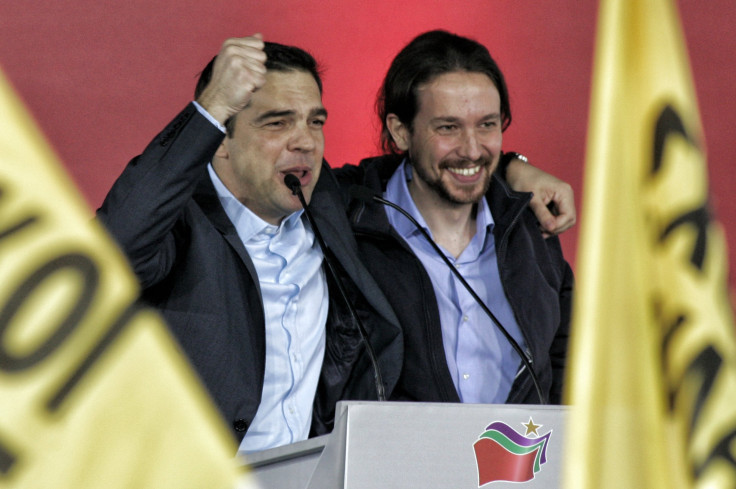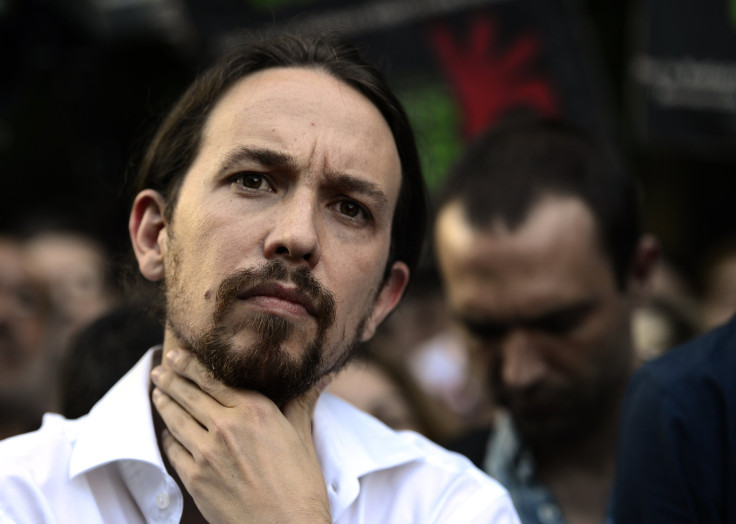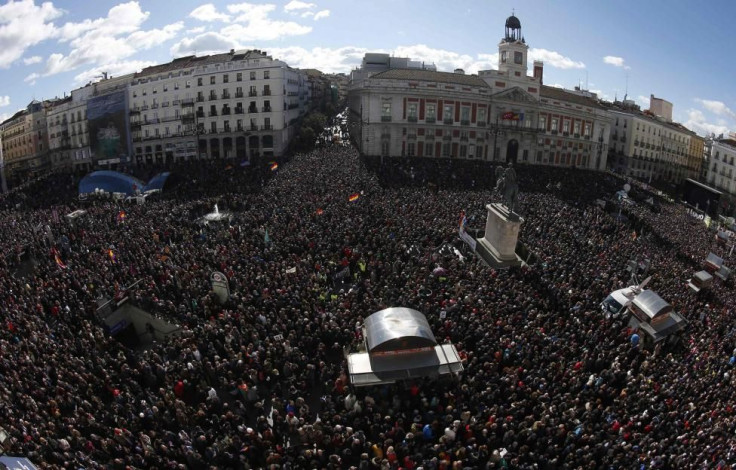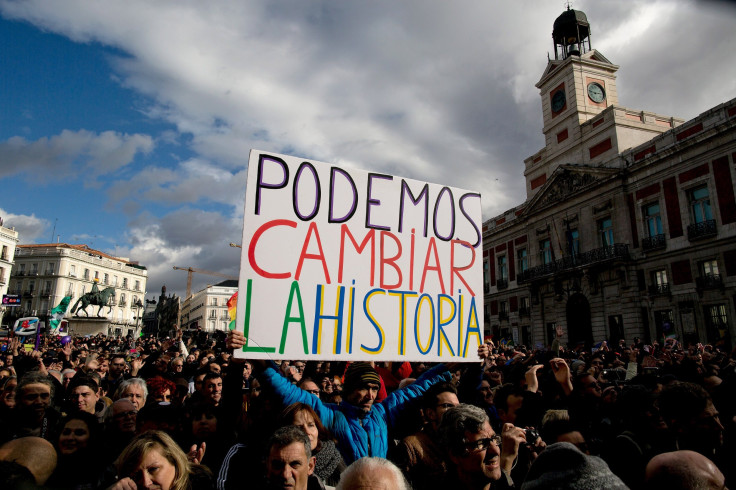European Anti-Austerity 2015: Podemos, Spain's Protest Party, Looks To An Uncertain Future After Tsipras Resignation, Dips In The Polls

Jose Ignacio Torreblanca remembered the moment when some of his university colleagues in Spain started to mobilize politically. It was 2014 and people in the nation were becoming increasingly desperate, as unemployment continued to climb and many families subsisted on just a couple of hundred euros a month. He could not have predicted back then that those professors, identified by their ponytails and conversational approach to politics, would become the founders of the Podemos party. The far-left group took the nation by storm in 2015, calling for an overhaul of the governing system and preaching increased government spending in the limping economy.
“They [made] an offer of radical change at a moment in which everyone was really fed up with the system,” said Torreblanca, 46, who has since left his teaching job to work for the European Council on Foreign Relations, a Europewide think tank focusing on policy issues. “The guys in Podemos realized that the traditional parties were not able to capture the anger of the people,” he said.
Many Spaniards initially hailed Podemos as a political savior. The group's criticism of austerity policies that included budget cuts and reduced social spending in exchange for European loans resonated with thousands of citizens who said austerity only made their taxes high and did nothing to improve their daily lives. But as Podemos' popularity started to wane, exacerbated by its association with former Greek Prime Minister Alexis Tsipras' Syriza party and culminating with its lowest polling numbers Tuesday, political experts and party members alike speculated about the party’s future and its ability to reform a debt-stricken Spain.
Podemos had support from only 15 percent of voters, according to a recent survey published in the Spain Report on Tuesday, down nearly half from the height of its popularity in early 2015. The poll found that mainstream parties that previously lost voters to Podemos were regaining ground and had support from a combined 54.2 percent of those surveyed.
“The example of Greece has been very damaging to [Podemos],” said Torreblanca, who added, "They welcomed Alexis Tsipras as the beginning of the liberation.”

The Podemos party, translated as “We Can,” first rose to prominence in Spain in January 2014, garnering support from an electorate that was dissatisfied with the ruling parties’ approach to recovering from a 2008 recession that continued to keep wages low and unemployment sky-high.
The group, led by political science professor Pablo Iglesias, built its platform in opposition to the austerity policies adopted by most debt-stricken European nations, which included budget cuts and higher taxes in exchange for debt-relief loans from European lenders. Podemos leaders have often resisted the designation of "radical left," saying the group exists too far outside of the mainstream to be right or left.
Many Spanish voters said austerity measures had made life impossible, with social services slashed to the bare bones, average monthly incomes at a few hundred euros and youth unemployment at nearly 50 percent. Almost one in four people were unemployed, and voters demanded higher minimum wages, more job creation and better transparency from a reportedly corrupt government.
Iglesias, 36, was also a highly charismatic figure who spoke to voters and interviewers alike in a friendly tone, free of the posturing and stock responses that he criticized career politicians for adopting. His singular approach to politics was epitomized in a campaign ad featuring Iglesias sitting on the back of a motorcycle.
“They call it an experiment and chaos. We call it democracy!” shouted Iglesias during a January rally that drew 100,000 people to Madrid’s central Puerta del Sol square.
By May 2015, Podemos had swept many local elections, winning important mayoral seats in major cities like Barcelona and destabilizing parties that had held positions since the 1980s.
Iglesias was very close with Greece’s Tsipras, both ideologically and personally, and he took the Greek Syriza party as a kind of model for his own group. To Iglesias, Syriza represented a promise that a radical shift in governance was possible and that the old ways of governing were not immovable.
After Tsipras resigned Aug. 20 amid splintering factions within his party and dissatisfaction from supporters who said he had not made good on his promises to protect Greek interests, many people across Europe began losing faith in the power of anti-austerity.

One of the main driving factors in Podemos' recent decline, in addition to the damaging example set by Tsipras, has been the challenges the group faced in making the shift from the idealism of their campaigns to the practicalities of daily governance, political experts have said. After Podemos candidates won major seats in the regional elections in May, they found themselves in the strange position as members of a ruling class against which they had once fought.
“It’s difficult to run as an anti-mainstream party when your members are the mayors of major cities,” said Jacob Funk Kierkegaard, a research fellow at the Peterson Institute for International Economics in Washington. “There is a difference between campaigning and governing, and they have clearly had to become not only more pragmatic but make more compromises.”
Oriol Bartomeus, a political science professor in Barcelona who has tracked the progress of Podemos, was optimistic for the group's future and said he believed that the lower poll numbers did not spell the end of Podemos or of anti-austerity in Europe. “[Podemos] had a big surge at the beginning, and now they are facing a big confrontation with the traditional parties and the media,” Bartomeus said Wednesday.
“They are normalizing. It was not normal to come from zero and to lead the polls in just a few months,” he said, adding that the group likely will adjust to the shifting political landscape post-Tsipras before the national parliamentary elections in November.

While the party's future is uncertain, Podemos leaders and political experts have both said they believe the party changed the discourse of mainstream Spanish politics and gave citizens a public voice to express their dissent.
“Podemos will face a very difficult election process in the next few months," said Jaime Paulino Cuenca, the secretary general in the region of Valencia who was elected recently after running on the Podemos ticket. "But that is a very normal thing, because against the big parties, we have lots of handicaps,” he added, pointing to the party's smaller budget and grassroots style.
Cuenca, 32, insisted he has not given up on the group's ideals and goals for the Spanish people. “There is a social reality that we still try to transform, humbly, into a political reality,” he said.
© Copyright IBTimes 2024. All rights reserved.












